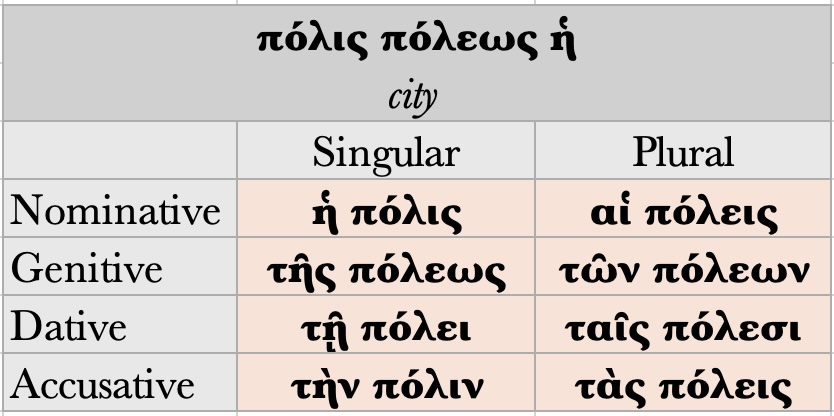24.1 In this lesson, we conclude our discussion of 3rd Declension nouns. Here we introduce noun stems ending in –ι, and –υ.
Most nouns preserve this stem vowel only in the NOMINATIVE and ACCUSATIVE SINGULAR. In the other cases and numbers, –ε replaces –ι as the stem vowel (S 268-271, G 130-131a). This class of nouns shares a number of other attributes, including:
- These nouns are usually feminine.
- The genitive singular ending lengthens from –ος to –ως.
- Neither the –εως ending of the genitive singular nor the –εων ending of the genitive plural draw the accent off of an antepenult.
- The accusative singular uses –ν (familiar from the definite article) instead of –α.
- The nominative and accusative plural both end in –εες, which contracts to –εις.
As with nouns with –ερ stems, these changes in the noun stem and accent patterns require memorization. The good news is that all the –ι stem nouns in the vocabulary share the inflection pattern of πόλις, πόλεως, ἡ city:
- Read more
-
The fact that the –εως and –εων endings do not draw the accent off of an antepenult is striking. This peculiarity is the result of changes in the pronunciation of words like πόλις. The earlier form of πόλεως was πόληος. The η and ο switched their vowel lengths over time (η shortened to ε, and ο lengthened to ω!), in a process called TRANSFERENCE OF QUANTITY (S 34, G 28). The accent, however, stayed on the antepenult during this process. The accent of the genitive plural gradually switched to the antepenult to match the genitive singular accent.
Transference of quantity is similar to METATHESIS, in which a vowel and consonant can switch places (S 128). English pronunciation has a number of such switches. For example, a vowel can switch places with an “r” in actual pronunciation for many English speakers: iron is often pronounced iern, and prescription pronounced perscription.


